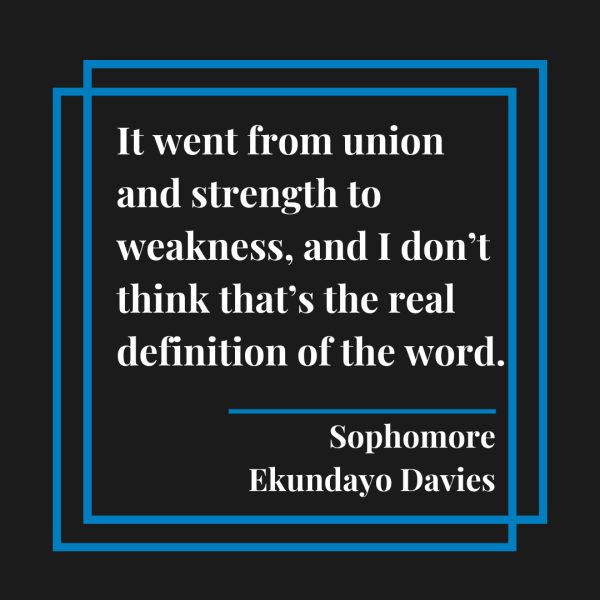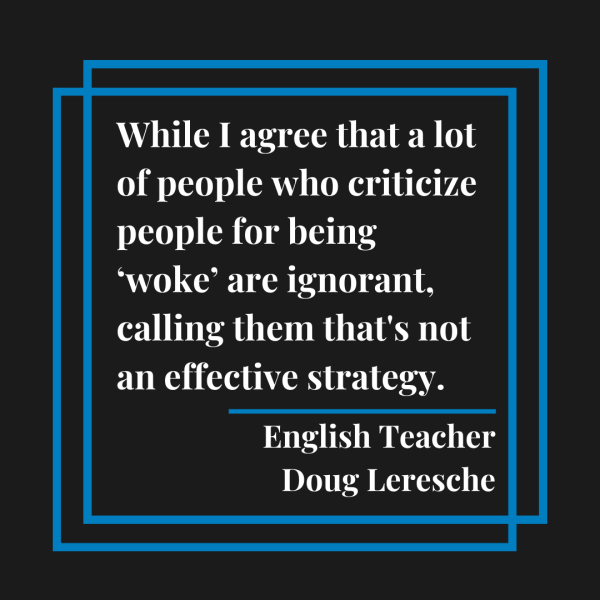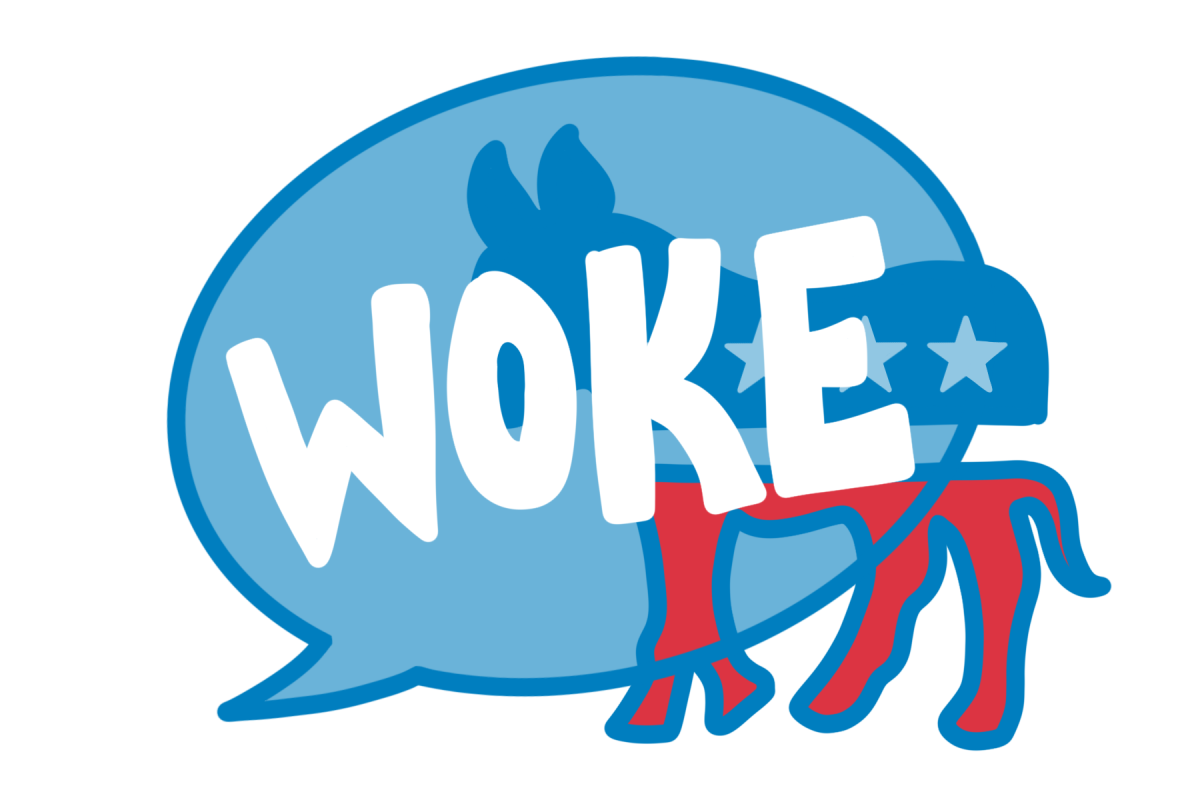Growing up, sophomore Ekundayo Davies often heard his father using the word “woke.” Although he had never been sure about its origin, to him, the term commended awareness of social issues.
“It’s just always been around for me,” Davies said. “When I was younger, it was more in a positive context, somebody against discrimination and aware of what’s happening.”
However, that has since changed. Davies recalls a situation where he was discussing racism with someone, only to be dismissed as “one of the ‘woke’ ones.”
“Woke” has been used to describe social awareness as early as 1938, as a part of musician Huddie Ledbetter’s song “Scottsboro Boys.” The Scottsboro Boys were a group of nine African American teenagers falsely accused of rape and sentenced to death. The song ends with an interview segment where Ledbetter says, “So I advise everybody, be a little careful when they go along through there — best stay woke, keep their eyes open.”
In recent years, renewed attention towards movements such as Black Lives Matter has propelled “woke” back into the spotlight, acting as a catch-all term for social justice and leftist ideology. At a 2021 campaign event, former president Donald Trump used the word to insult the state of the military under the Biden administration, making the association between a “woke” person and a weak person.

“You hear older people talk about how this next generation is getting soft,” Davies said. “And I think ‘wokeness’ falls into that category of softness because we aren’t as tolerant of offensive content and offending other groups.”
Due to those negative connotations, the meaning of “wokeness” has been warped into something less empowering, a term used to imply character flaws in people with certain social beliefs.
“Back then, it seemed more like there was unity in being ‘woke’ against racism and discrimination of any sort,” Davies said. “But now you’re anti-American or weak for having those ideals. It went from union and strength to weakness, and I don’t think that’s the real definition of the word.”
Sophomore Jivika Gulrajani agrees that the term has shifted to being less serious, and as a result, less effective at communicating actual political opinions.
“I’ve heard the word ‘woke’ being used more as a comedic effect,” Gulrajani said. “I feel like
the modern idea of being ‘woke’ is being a crazy liberal person who doesn’t really know what they’re talking about, but says things just to sound like they’re liberal and ‘woke.’ Because of that, the word ‘woke’ has become a watered down thing that people use … in a joking matter, but not really as serious activism.”
Junior Kartik Patri thinks the unclear connotations around the word “woke” has fundamentally changed its meaning.
“When people use a word, and when no one corrects them for their wrong usage of that word, it starts to become more popular until it becomes the fake truth,” Patri said. “Now, people start using the word and believing that a word can be something other than what it actually means, and then that word loses meaning.”
As Gulrajani elaborates, when “woke” has such a muddled meaning, it can be hard to take the conversation seriously even if the underlying ideas could be worth engaging with. Davies worries that for the word “woke” in particular, this shift has negatively affected the ideals it originally represented, such as being against discrimination or being aware of social topics.
“I think when positive terms turn into negative ones, it becomes a larger issue,” Davies said. “We see people reclaiming terms, like the Black community reclaiming the N-word. But this feels like the opposite, where a term that has been used to empower and build union has become self-destructive.”
Instead of using “woke,” Davies brings up positive alternatives such as culturally aware, anti-racist, and anything that conveys the same idea that “woke” used to: “being awoken to your environment.”

Black Student Union advisor Doug Leresche also notes that using “woke” as a means of implying superiority over the other person — to say that they’re fundamentally less attuned to the world — can curate hostility during discussions.
“I just don’t think it’s an effective approach to point out that someone else is not ‘woke,’ or that someone else has not made these realizations that, for you, might be obvious because of your own experiences,” Leresche said. “While I agree that a lot of people who criticize people for being ‘woke’ are ignorant, calling them that’s not an effective strategy.”
However,Leresche says awareness isn’t enough to address the core social issues that “woke” existed to illuminate.
“I think [‘woke’] is still an important thing to be,” Leresche said. “But it’s not something where you can just be like, ‘Oh, I want to be “woke,”’ read a paragraph, and be like ‘cool, there’… if you’re not actually the one going out and … calling people out, then you’re not ‘woke.’ You just have some good ideas you’re too scared to act on.”
Leresche emphasizes questioning as an important strategy. Instead of using vague labels like “woke” to attack sides, students can ask questions about people’s beliefs and address them on that level. This way, they can avoid the mistake of arbitrary grouping. However, he also acknowledges that many people are ignorant of their own habits and behaviors, even when they believe themselves to be “woke.”
Gulrajani agrees, adding that showing off perceived awareness is insensitive rather than helpful. For that reason, she does not consider herself “woke” because she still believes there are more societal issues she could be better educated on.
“Oftentimes we use [‘woke’] as a thing to sound like, ‘I know what I’m talking about, so I don’t have to learn anything more,’” Gulrajani said. “‘I know what I’m talking about, so you can’t educate me on anything. Like I’m done. I’m done for the day. I punched out. I’ve clocked out.’ But I think that’s not true. You’re never going to clock out. You’re never going to punch out. There’s always more to learn. There’s always more to do.”










